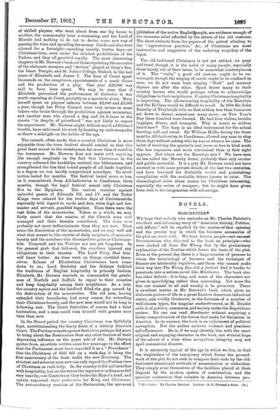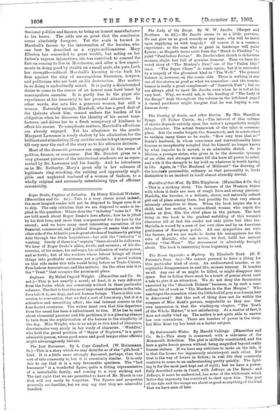NOVELS.
MOB,CHESTERA
WE hope that nobody who embarks on Mr. Charles Datohet's excellent and informing story of "American Society, Politics, and Affairs" will be repelled by the matter-of-fact opening and the precise way in which the business accessories of the plot are dealt with. We have known people—not earnest Stevensonians who objected to the book on principle—who were choked off from The Wrong Box by the preliminary explanation of the Tontine which forms the basis of the plot. Even at the present day there is a large number of persons to whom the terminology of business and the technique of finance are intolerably repulsive, and those who cannot make their way into The Wrong Box will a fortiori find it harder to penetrate into a serious novel like Morchester. The book also has other defects : it is long, and some of the characters are given to speechifying rather than conversing. Yet none the less our counsel to all and sundry is to persevere. There is excellent matter in Mr. Datohet's book, which gives an elaborate picture of life in a great Eastern American industrial centre, and vividly illustrates, in the fortunes of a number of well-chosen types, the singular enchevitrement, as M. Daudet calls it, of politics, commerce, and society under the Republican system. No one can read Morchester without acquiring a better comprehension of the forces that make for Socialism in America. In its essence, the book is an indictment of political corruption. But the author eschews violence and practises self-effacement. He is, if we may identify him with the most original and engaging character in the book, not without hope of the advent of a time when scrupulous integrity may not spell commercial disaster.
It is eminently typical of the age in which we live, in that the ringleaders of the conspiracy which forms the ground- work of the plot do not seek to compass their ends by the old- fashioned sensational methods of assassination or abduction. They simply avail themselves of the facilities placed at their disposal by the modern system of combination, and the peculiar connection that subsists in America between pro.
• Idorchester. By Charles DatchoL London: G. P. Putnam's Sow. Os.]
fessional politics and finance, to bring an honest manufacturer to hie knees. The odds are so great that the conclusion seems absolutely foregone. Yet the scale is turned in Marshall's favour by the intervention of the heroine, who can best be described as a crypto-millionairess; Mary Ellerton has succeeded to great wealth, but acting on her father's express injunctions, she has contrived to conceal the fact on coming to live in Morchester, and after a few experi- ments in doing good by stealth on a small scale, she puts forth her strength—without Marshall's knowing it—to back his firm against the ring of unscrupulous financiers, lawyers, and politicians who are bent on his destruction. Her motive in so doing is undoubtedly mixed. It is partly a disinterested desire to come to the rescue of an honest man hard beset by unscrupulous enemies. It is partly due to the pique she experiences at his immunity to her personal attractions. In other words, she acts like a generous woman, but still a woman. Naturally enough, Marshall, who has a good deal of the Quixote about him, cannot endure the burden of his obligation when he discovers the identity of his secret bene- factress, and drives her to a fresh conspiracy of kindness to effect his rescue. To complicate matters, Marshall's affections are already engaged. Yet his allegiance to the gentle krargaret Lawrence is sorely shaken by his admiration for the brilliant and stimulating Mary, and the reader is kept in suspense till very near the end of the WIT as to his ultimate decision.
Most of the dramatis personae are engaged in the arena of politics, finance, or commerce. But Mr. Datchet gives us a very pleasant picture of the intellectual academic set as repre- sented by Dr. Lawrence and his family. And he introduces us in Mr. Netherby, Mary's great ally in her schemes of legitimate ring-wrecking, the retiring and apparently negli- gible and neglected husband of a woman of fashion, to a wholly original and extremely entertaining type of efficient eccentricity.







































 Previous page
Previous page